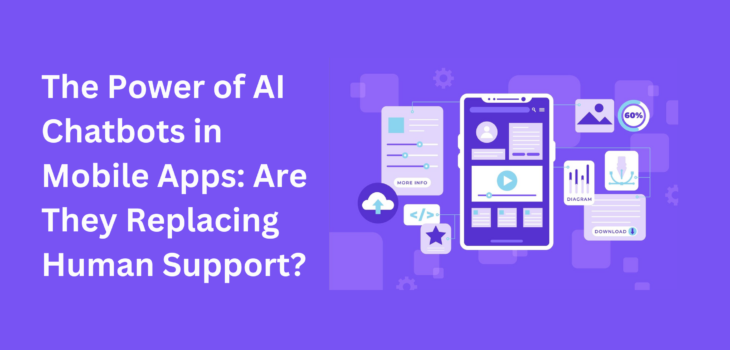 Business
Business
The Power of AI Chatbots in Mobile Apps: Are They Replacing Human Support?
The AI Chatbot Takeover: Hype or Reality?
Picture this: You’re frustrated with an issue on your favorite shopping app. Instead of waiting on hold for a human agent, you type your question into the chatbox. Within seconds, you get a detailed response. No waiting, no back-and-forth confusion, just quick and efficient support. But here’s the catch—you’re not talking to a human.
AI-powered chatbots have become the backbone of customer support in mobile apps, promising instant responses, 24/7 availability, and cost savings for businesses. But are they truly replacing human support? Or is there a limit to how far AI can go in mimicking human interactions?
Let’s dive deep into the role of AI chatbots in mobile apps, their strengths, weaknesses, and whether they are really pushing human support out of the equation.
The Rise of AI Chatbots in Mobile Apps
It wasn’t long ago that customer support meant navigating endless phone menus, waiting on hold, and repeating the same issue to multiple agents. The frustration was real. Then came chatbots—digital assistants designed to make life easier.
Powered by artificial intelligence and natural language processing (NLP), chatbots are no longer simple rule-based responders that spit out generic answers. They’ve evolved into intelligent systems capable of understanding context, detecting emotions, and even predicting user intent.
Today, AI chatbots are embedded in mobile apps across industries—banking, healthcare, e-commerce, travel, and more. Whether it’s Siri answering queries, a banking app guiding users through transactions, or a food delivery chatbot updating you on your order, AI is everywhere.
What Makes AI Chatbots So Powerful?
-
Instant and 24/7 Availability
Unlike human agents who need breaks, chatbots don’t sleep. They provide round-the-clock support, making them an invaluable asset for businesses that cater to a global audience. -
Speed and Efficiency
A well-trained chatbot can process thousands of customer queries simultaneously. No more long wait times—responses are instant, and transactions are completed in seconds. -
Cost-Effective for Businesses
Hiring, training, and maintaining a customer support team is expensive. AI chatbots significantly cut costs by automating repetitive tasks and reducing the need for large support teams. -
Multilingual Support
Many AI chatbots are equipped with real-time translation capabilities, breaking language barriers and making mobile apps accessible to a wider audience. -
Personalization at Scale
AI chatbots analyze user data to offer personalized recommendations, promotions, and support. They remember past interactions, allowing for a seamless user experience. -
Reduced Human Error
Unlike human agents who may provide inconsistent responses, AI chatbots follow predefined training models, ensuring accuracy and reliability in their interactions.
The Limitations of AI Chatbots
For all their advantages, AI chatbots are far from perfect. They have limitations that make human support indispensable in certain situations.
-
Lack of Emotional Intelligence
AI chatbots can detect sentiment, but they don’t feel emotions. A frustrated customer venting about a serious issue may not find comfort in a pre-programmed response. Humans, on the other hand, can empathize, reassure, and build trust. -
Struggles with Complex Queries
While AI chatbots handle common questions well, they often struggle with complex or unique issues that require human judgment. Customers facing technical problems or urgent concerns may get frustrated with a bot that fails to understand their situation. -
Risk of Misinterpretation
AI chatbots rely on NLP to process language, but context matters. A poorly trained chatbot may misinterpret a question and provide incorrect or irrelevant answers, leading to customer dissatisfaction. -
Security and Privacy Concerns
AI chatbots collect vast amounts of user data. If not handled properly, this raises concerns about data security, privacy breaches, and compliance with regulations. -
User Resistance
Not all customers are comfortable interacting with AI. Some prefer human interactions, especially for sensitive matters like banking disputes or healthcare concerns.
Are AI Chatbots Replacing Human Support?
Here’s the real question: Are chatbots eliminating the need for human support teams? The short answer—no. At least, not yet.
What’s actually happening is a shift in how customer service operates. AI chatbots are automating the first line of support—handling FAQs, basic troubleshooting, and transactional queries. This frees up human agents to focus on complex, high-value interactions where empathy and problem-solving skills are crucial.
Instead of replacing humans, AI chatbots are augmenting support teams, making them more efficient. Businesses that strike the right balance between AI-driven automation and human expertise see the best results.
AI Chatbots in Action: Industry Use Cases
-
E-Commerce
AI chatbots help customers find products, process refunds, provide personalized recommendations, and track orders—all without human intervention. -
Banking & Finance
Banking apps use AI chatbots to check account balances, detect fraudulent activity, assist with transactions, and offer financial advice. -
Healthcare
Virtual health assistants help patients book appointments, get medication reminders, and even provide preliminary symptom analysis. However, human doctors and nurses remain irreplaceable for actual medical care. -
Travel & Hospitality
From booking flights and hotels to handling cancellations and itinerary changes, AI chatbots make travel planning seamless. -
Tech Support
Companies use AI-driven virtual assistants to troubleshoot issues, guide users through setups, and provide instant solutions. But for major technical problems, human intervention is still required.
The Future: AI and Human Support Coexisting
As AI chatbots continue to evolve, their ability to handle complex tasks will improve. Advancements in generative AI and conversational models (like ChatGPT) are already making bots more human-like in their interactions.
However, no matter how sophisticated AI becomes, there will always be a need for human support. Businesses that rely solely on chatbots risk alienating customers who seek personal engagement. The future lies in hybrid models—where AI handles routine inquiries while human agents take over when deeper expertise and emotional intelligence are needed.
Conclusion: Striking the Right Balance
So, are AI chatbots replacing human support? Not entirely. But they are reshaping the way businesses approach customer service in mobile apps. AI brings speed, efficiency, and scalability, while human agents provide empathy, critical thinking, and nuanced problem-solving.
For companies looking to integrate AI-driven chatbot solutions into their mobile apps, working with app development services Atlanta can ensure a seamless, user-friendly experience. The key is balance—leveraging AI for automation without losing the human touch that customers still value.
The age of AI chatbots is here, but human support isn’t going anywhere just yet.









